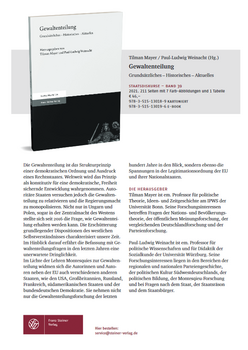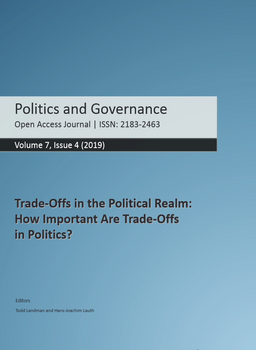Schlenkrich, Oliver. 2021. Origin and Performance of Democracy Profiles. Wiesbaden: Springer VS.
This study has two central research questions: Do democracy profiles affect policy performance? And what causes democracy profiles? Oliver Schlenkrich conceptualizes and measures different democracy profiles (e.g., libertarian-majoritarian or egalitarian-majoritarian democracies) based on trade-offs between the central democracy dimensions of political freedom, political equality, and political and legal control. In addition, the study conceptually and empirically develops a typology of political performance. Regarding the first research question, the empirical analyses of about 80 democracies from 1974 to 2017 indicate that there is not an overall better performing democracy profile. Thereby, the democracy profiles do not have an immediate effect, instead their effects require a longer period of time to manifest. With respect to the second research question, the empirical findings show that several structural and cultural factors are relevant (e.g., British heritage or a competitive culture). This work is mainly based on Bayesian statistics to cope with the complexity of the data and models.

The effects of populism on democracy are controversially discussed in academia. This article analyzes the effects of populist rule on the quality of democracy. After clarifying the basic concepts of populism and democracy, we compile the effect relationships with which positive and negative effects are associated. The relationships are bundled on the basis of hypotheses. Since we assume that the effects do not have a blanket impact on democracy, we examine the effects with the help of a differentiated democracy measurement. The use of the Democracy Matrix creates a specific profile that shows in which areas the quality of democracy is most or least affected or corrected. Case selection relies on a literature review to identify populist actors such as parties and presidents. The methodological approach is then based on a (Bayesian) time-series cross-sectional analysis to identify short-term and long-term effects of a populist opposition, a populist cabinet partner, and populist government. After presenting the empirical findings, the hypotheses are evaluated. Finally, the effect of populism on the development of the quality of democracy is discussed.
Lauth, Hans-Joachim and Lukas Lemm. 2021: Direkte Demokratie und die Qualität der Demokratie. In: Heußner, Hermann K, Arne Pautsch and Fabian Wittreck (eds.): Direkte Demokratie - Festschrift für Otmar Jung, 563-592. Stuttgart: Richard Boorberg Verlag.
The article provides an overview of existing measurement concepts of direct democracy and the quality of democracy. This is accompanied by a reflection on the measurement-theoretical foundations and approaches, which diverge considerably between the two. The focus is on an empirical examination of the relationship between the quality of democracy and direct democracy. Contrary to theoretical assumptions, this presents itself as rather weak and inconsistent. For future research, it therefore seems fruitful to look at specific elements of both concepts and to relate them in order to prevent bias in the results.
In the course of modern political developments, the separation of powers can be understood as a question of accountability, whose complexity can be bundled in the dimension of control. In the 20th century up to 2020, an increase in the control dimension can be observed, which, as expected, is significantly higher in democracies with separation of powers than in autocracies. At the same time, the individual elements of control develop quite differently. With the third wave of democratization beginning in the 1970s, there was a clear upswing in control by the media, which also spread to authoritarian states from 1990 onward. While this control by the media remains relatively stable at a high level in functioning democracies, it has declined in deficient democracies over the last twenty years. In the findings, it remains to be noted that the characteristics of the control components have shifted over the course of history. Whereas in the democracies at the beginning of the 20th century the institutional procedures of the classical separation of powers were primarily in place, in the young democracies control by the media and civil society is more virulent. From this perspective, it appears easier to introduce basic democratic procedures than to establish rule-of-law principles. But this process had a long history in Europe as well. In any case, it seems more attractive for political rulers to allow elections than to expose themselves to constant and effective institutional control.
Typologies are widely applied tools in democracy research. There are two prominent ways of constructing subtypes of democracies: whereas the classical approach adds traits successively to gain regular subtypes, the radial approach subtracts traits from the concept to obtain diminished subtypes. Conceptually, we argue that radial types have distinct advantages over the classical approach. Diminished subtypes can deal with complex concepts with multiple interrelated dimensions without a clear hierarchy and can account for the gradual nature of political phenomena. We derive three diminished subtypes of democracy: illiberal, inegalitarian and unaccountable democracies. The empirical analysis draws on a customized version of the new Varieties of Democracy dataset. Contrary to the dominating criticism of the radial delusion by the classical approach, an elaborate cluster analysis with a strong focus on validation and robustness checks can identify empirically the deductively proposed diminished subtypes of democracies which could not be demonstrated so far.
Open Access
This study examines types of democracies that result from trade-offs within the democratic quality. Recently, the existence and relevance of trade-offs has been widely discussed. The idea is that the functions associated with the quality of democracy cannot all be maximized simultaneously. Thus, trade-offs are expressed in distinct profiles of democracy. Different profiles of democracy favour certain democracy dimensions over others due to their institutional design. Conceptually, we differentiate between four different democracy profiles: a libertarian-majoritarian (high political freedom, lower political equality, and lower political and legal control values), an egalitarian-majoritarian (high equality combined with lower freedom and control values), as well as two control-focused democracy profiles (high control values either with high degrees of freedom or high degrees of equality). We apply a cluster analysis with a focus on cluster validation on the Democracy Matrix dataset—a customized version of the Varieties-of-Democracy dataset. To increase the robustness of the cluster results, this study uses several different cluster algorithms, multiple fit indices as well as data resampling techniques. Based on all democracies between 1900 and 2017, we find strong empirical evidence for these democracy profiles. Finally, we discuss the temporal development and spatial distribution of the democracy profiles globally across the three waves of democracy, as well as for individual countries.
Open Access
Whereas the measurement of the quality of democracy focused on the rough differentiation of democracies and autocracies in the beginning (e.g. Vanhanen, Polity, Freedom House), the focal point of newer instruments is the assessment of the quality of established democracies. In this context, tensions resp. trade-offs between dimensions of democracy are discussed as well (e.g. Democracy Barometer, Varieties of Democracy). However, these approaches lack a systematic discussion of trade-offs and they are not able to show trade-offs empirically. We address this research desideratum in a three-step process: Firstly, we propose a new conceptual approach, which distinguishes between two different modes of relationships between dimensions: mutual reinforcing effects and a give-and-take relationship (trade-offs) between dimensions. By introducing our measurement tool, Democracy Matrix, we finally locate mutually reinforcing effects as well as trade-offs. Secondly, we provide a new methodological approach to measure trade-offs. While one measuring strategy captures the mutual reinforcing effects, the other strategy employs indicators, which serve to gauge trade-offs. Thirdly, we demonstrate empirical findings of our measurement drawing on the Varieties of Democracy dataset. Incorporating trade-offs into the measurement enables us to identify various profiles of democracy (libertarian, egalitarian and control-focused democracy) via the quality of its dimensions.
Die Komplexität und Heterogenität der Gesellschaft verstärken sich in vielfacher Weise. Damit steigen die Ansprüche an die Leistungsfähigkeit politischer Systeme. Für die Demokratien sind vor allem zwei Aufgaben zu lösen: Erstens sollen sie trotz komplexer Problemlagen in der Lage sein, angemessene Entscheidungen zu treffen und Lösungen zu finden. Zweitens sollen sie die Integration der Gesellschaft sichern. In unserem Beitrag diskutieren wir, welche institutionelle Ordnung sich dafür am geeignetsten zeigt. Dazu greifen wir mit der Unterscheidung von Mehrheits- und Konsensdemokratie zwei Demokratieprofile auf. In der theoretischen Diskussion scheint Konsensdemokratie dabei die attraktivere Lösung zu sein. Doch zugleich besteht die Möglichkeit, dass sie – nicht intendiert – zur Förderung populistischer Parteien beiträgt. Auch Befunde empirischer Forschung unterstützen diese Sichtweise. Doch lassen sich zugleich Zweifel benennen. Daher überprüfen wir diesen Zusammenhang mit einer innovativen Modellierung, die Individualebene und Strukturdaten verbindet. Untersucht werden politische Einstellungen (Empfänglichkeit für Populismus), die Wahl von populistischen Parteien und die Ausprägung des Regierungssystems (Konsens- vs. Mehrheitsdemokratie) in 20 Ländern. In der Analyse zeigt sich, dass das Demokratieprofil zwar keinen direkten Effekt auf die Wahl populistischer Parteien besitzt, aber Befragte in Mehrheitsdemokratien scheinen empfänglicher für Populismus zu sein. In der Diskussion werden weitere Kontrollvariablen geprüft, die letztlich die Attraktivität von Konsensdemokratien als Demokratieprofil in komplexen Gesellschaften unterstreichen.
Definitions of democracy almost always refer to dimensions. An important question arises about the internal relationships between them. This article presents arguments in favor of the ideas of mutual reinforcement as well as of intrinsic tensions or trade-offs. A well-known example of these kinds of trade-offs is the complex relationship between liberty and equality. Surprisingly, trade-offs are not reported when measuring democracy. The article identifies the basic methodological problem and develops a new strategy for evaluating the indicators which makes trade-offs visible in the empirical research. The proposal combines two measurement strategies, arguing that in addition to established measurements of democracy, a further measurement to assess trade-offs should be employed.
Open Access
The article presents a proposal for the assessment of the quality of democracy. After elaborating on the methodological strategy, a definition of democracy is proposed, which entails the construction of the matrix of democracy based on three dimensions (political freedom, political equality, and political and judicial control) and five institutions. The methodological application of this measuring tool is then explained. This conception guarantees an appropriate measurement in different cultural contexts, enables the characterization of democratic profiles, and allows for the identification of deficiencies in democracies. Before the conclusion, three examples of the measurement (USA, Russia, and Italy) illustrate how the matrix works.
Diese Arbeit verknüpft die theoretische Demokratiediskussion mit dem neuen Forschungsgebiet der Demokratiemessung. Zwei zentrale Fragen liegen der Untersuchung zugrunde: (1) Wann ist ein politisches System als Demokratie zu verstehen? (2) Wie demokratisch ist eine bestehende Demokratie? Die Arbeit gliedert sich in drei Teile. Das erste Kapitel verfolgt das Ziel, ein angemessenes Modell der Demokratie zu entwickeln, das erlaubt, ihre Qualität im interkulturellen Vergleich zu beurteilen. Im zweiten Kapitel wird mittels des Einbezugs von Institutionen der Weg der Operationalisierung beschritten. Zu prüfen ist hierbei, inwieweit diese "informellen Institutionen" kompatibel mit der Demokratie sind oder als Indikator für Störungen gewertet werden müssen. Im Zentrum des dritten Kapitels steht die Auseinandersetzung mit den Grenzen und Möglichkeiten der Demokratiemessung. Auf der Grundlage der Diskussion der gängigen Messkonzepte (Polity, Freedom House, Vanhanen, democratic audit) wird ein eigener Messvorschlag entwickelt, mit dessen Hilfe das Maß beziehungsweise die Qualität der Demokratie in ihren Dimensionen gemessen werden kann. Die Arbeit verfolgt somit drei grundlegende Ziele: (1) Die Konstruktion eines Demokratiemodells für den inter-kulturellen Vergleich, (2) die Identifizierung zentraler Institutionen der Demokratie unter Einbezug der Relevanz informeller Institutionen und drittens (3) die Entwicklung einer Messanlage zur empirischen Bestimmung von Demokratien.







![[Translate to English:] Abbildung: Lauth, Hans-Joachim und Oliver Schlenkrich. 2018. Making Trade-Offs Visible: Theoretical and Methodological Considerations about the Relationship between Dimensions and Institutions of Democracy and Empirical Findings. Politics and Governance 6 (1): 78–91.](/fileadmin/_processed_/5/5/csm_lauth_schlenkrich_making_ce8d5bb247.png)
![[Translate to English:] Abbildung: Lauth, Hans-Joachim und Oliver Schlenkrich. 2018. Demokratie in komplexen Gesellschaften. Demokratieprofile – Responsivität – Populismus. In: Mannewitz, Tom [Hrsg.]: Die Demokratie und ihre Defekte, 145-168. Wiesbaden: VS-Verlag.](/fileadmin/_processed_/f/8/csm_Lauth_Schlenkrich_Populism_1211dd89ce.png)
![[Translate to English:] Abbildung: Lauth, Hans-Joachim. 2015. The Matrix of Democracy: A Three-Dimensional Approach to Measuring the Quality of Democracy and Regime Transformations, Würzburger Arbeitspapiere zur Politikwissenschaft und Sozialforschung (WAPS) Nr. 6.](/fileadmin/_processed_/3/f/csm_lauth_2015_democracy_matrix_058f35902f.png)
![[Translate to English:] Abbildung: Lauth, Hans-Joachim. 2004. Demokratie und Demokratiemessung. Eine konzeptionelle Grundlegung für den interkulturellen Vergleich. Wiesbaden: VS Verlag.](/fileadmin/_processed_/3/8/csm_lauth_2004_d3741ecaf3.png)